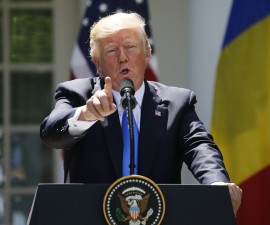(单词翻译:单击)
HARI SREENIVASAN, PBS NEWSHOUR WEEKEND ANCHOR: President Trump spent a good part of last week touting his campaign pledge to spend a trillion dollars to rebuild the nation's infrastructure. But other than talking generally about public-private partnerships for those investments, privatizing air traffic control, and dismantling regulations that can delay construction, the White House has yet to put forward a detailed plan.
Washington Post reporter Mike DeBonis is covering the issue and joins me now from Washington.
Infrastructure takes a long time to building and a long time to plan. So, what's at stake here?
MIKE DEBONIS, WASHINGTON POST REPORTER: As you mentioned, you know, these projects are in the pipeline for years, in some cases, a decade or more. And what's at stake is a certainty about a path forward and the longer there is uncertainty, the harder it is to plan these projects. And what we've seen in a lot of cases is that the Trump administration is created more uncertainty particularly seen this in the realm of public transit, but there's also world (ph) projects, port projects, things like that, where they made moves particularly in their budget that have a lot of people scratching their heads.
SREENIVASAN: So, give me an example. I mean, give me an example of the city or municipality that's been working on something, or thinking about building something waiting for the funds?

DEBONIS: Sure. We have — example are transit projects. We — there's a federal transit administration program that typically spends four or five billion dollars a year building transit projects across the country. These aren't just big cities and Democratic states. A lot of these are in red states, places like Arizona, Indiana, North Carolina.
They've, you know, been in the process over a course of months and years expecting to get a federal contribution of these projects. The budget that was released proposes zeroing out one of these transit accounts that would halt some of these projects in their tracks, at the very least, it would force localities to come up with tens of millions of more dollars that they weren't expecting to.
SREENIVASAN: And so, what's the likelihood of something like this, let's say a plan is put forth and gets through Congress, because members of Congress are very proud about what sport sort of dollars they can get in into their communities. Oftentimes, states are the ones that actually own the infrastructure on the ground.
DEBONIS: Well, obviously, Congress ultimately spends the money. And there is buy in, by and large, among local representatives, in places where these projects are happening. That said, you have a, you know, major faction of the Republican Party that wants to reduce discretionary non-defense spending to low levels and this politically and for many of them on principle, it's a good place to find cuts.
Politically, you know, these are, you know, by and large theirs the perception these are projects that are going to benefit Democrats. They're typically even when they're in red states, they're in Democratic pockets and big cities. Policy-wise, there's a feeling among deficit hawks in Republican Party, but simply speaking, that projects like this should be funded locally, that the federal government shouldn't have a role, that these are not projects of national import.
So, you know, you're right to say that ultimately Congress is going to have the say and probably not going to zero out these projects entirely but there is going to be a huge amounts of pressure on projects like this to, you know, sort of be on the chopping block.
SREENIVASAN: All right. The Washington Post's Mike DeBonis — thanks so much.
DEBONIS: Thanks, Hari.


